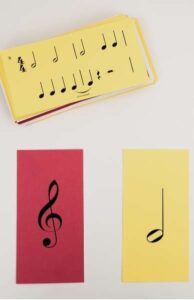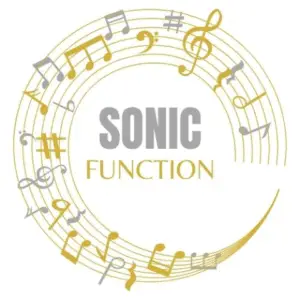
While knowing how to play an instrument isn’t absolutely crucial to learning music theory, it will make learning exponentially easier. Even having a basic knowledge of how to play an instrument will go a long way in helping you understand first-year theory
In college there are 3 courses that go hand in hand, music theory, sight singing & ear training, and functional piano. Basically this ensures that you will develop you musical analytical skills at the same time you develop your critical listening skills and your piano skills.
This is all by design since you are learning the same concepts at the same time from the perspective of each class.
Okay, that sentence was a mouthful and probably overcomplicated. Basically, this trio of classes is set up like this:

All lessons are structured similarly. You learn the analytical part while also learning to sing what you’re studying while also learning to play it on the piano.
While these three courses do start to diverge from each other towards the end of your second year of college (give or take, depending on the college) they are still meant to go hand-in-hand during your first several semesters of study.
While taking this trio of courses you end up learning to play an instrument, piano in this case, to a reasonably good level.
Outside of college, there is no instrument requirement…there are countless resources available to learn whatever aspects of music theory (and any number of other musical areas) that you’d like. Further down in this article I’ll throw a few options out there for you to check out, but the bottom line is for independent study, you do not have to play an instrument to learn music theory.
But it will make it so much easier if you do…
I Don’t Play An Instrument, What Else Can I Use Music Theory For?
Music theory is really more for the analysis of music and understanding how things go together. While musicians can greatly benefit from learning theory it’s really much more needed for composers…and even then there are many composers and songwriters who never learned music theory.
Aside from composition, songwriting, and associated side jobs (like copyists and arrangers), the only other people that would have any professional need for music theory are music theory professors.
Non professionals can use theory to have a better understanding of the music that they enjoy.
Will My Composition Skills Be Limited If I Don’t Play An Instrument?
For serious, fully fleshed-out pieces yes, not playing an instrument is going to hold you back a bit. There are very few composers that I can think of that don’t know how to play an instrument…at least at a basic level.
In his Master Class, Joel Zimmerman (DeadMau5) shows how he creates his EDM music. While drawing in the lines (a common phrase when composing on a piano roll in software such as Cubase) he even admits that his job would be a lot easier if he could “play” the music in rather than drawing it in.
Now, in this case, Zimmerman’s compositional ability isn’t in question…I mean, the guy has sold millions…but there is definitely some hindrance in his writing process that knowing how to play an instrument…a keyboard, in this case, would solve.
And this doesn’t mean that learning piano or keyboard is your only option…guitar, saxophone, trumpet, mallet percussion, etc.…any of these will help immensely since they teach you notes, rhythm, song structure, and more.
The exception here would be drums or non-melodic percussion. While these instruments are terrific for composing complex rhythms (percussionists usually learn diverse rhythms sooner than other musicians)their lack of melodic capabilities don’t really help with composing themes and harmonies.
So, with all that said above the main takeaway here is that while playing a melodic instrument isn’t completely necessary it will make composing much simpler. You’ll be able to test melodies and different variations and keys. If your new melody sounds great in a major key, you can try it out in a minor key.
More tools in your tool belt is never a bad thing!
Can I Learn Music Theory If I Can’t Read Music?
No, you need at least a basic understanding of notes and rhythms in order to learn music theory. While having dynamic skills in sight-reading isn’t necessary, having a rudimentary knowledge of music notation is needed. It would be like writing a book report if you didn’t understand how to read English.
If you have no understanding of how to read music or don’t know the notes of a piano, then most colleges offer some sort of fundamentals class…usually called Music Fundamentals. First-semester theory is also designed to ease you into things. You won’t be forced to do complex analysis and figured bass on day one. Instead, you’ll start by learning scale degrees and building triads from each scale degree… these are the building blocks of chord structure that you’ll use for Roman Numeral Analysis.
If you are someone with no understanding of how to read music then take that fundamentals course. If you’re not a college student then consider private piano lessons.
These piano lessons aren’t necessarily for you to become a world-class pianist, they are to help you learn the notes, basic rhythms, and basic chords. You’ll also learn how to read treble and bass clef which will put you ahead of many first-semester music theory students.
What Can I Use To Learn Theory Instead Of An Instrument?
Thinking back, I don’t think being concurrently enrolled in private instrument lessons was a pre-requisite of being in music theory class…it was just sort of, implied. I mean, who else would be taking theory other than music majors? One school I did attend, however, did require you to also be enrolled in functional piano…but, if you’re studying on your own then there are workarounds.
Honestly, a music keyboard does help with recognizing note intervals and with easily counting up semitones (also called half steps…basically going up or down a piano keyboard without skipping any keys.)
Luckily, you don’t actually have to have a physical piano or music keyboard sitting on a stand next to you. There are plenty of keyboard images online that show any size, from octave to a full-size 88-key keyboard. If you want to get a little fancier, there are also plenty of free, web-based pianos and keyboards that will let you click the keys or type on your computer keyboard and get playback.
- Piano/Keyboard Guide – Basic, two and a half-octave keyboard diagram with note names listed.
- Online Pianist – Five-octave playable piano available online. Decent sound (though cutoff is a little sudden) and even has playability via a computer keyboard.
- Musica – Three-octave playable keyboard. This one lets you toggle the note name on/off and lets you mark notes and then have them playback. Great for sight singing exercises.
Between those two options go with the ones that playback…being able to hear what you’re trying to learn will always win out over a simple picture of a keyboard.

Once you have a favorite online keyboard bookmarked then welcome to the “overwhelming world of what’s online!”
Seriously…there are so many online resources to learn music theory. YouTube for free videos, Udemy for more organized and inexpensive courses, and then there are all the universities and colleges that have online programs including my former home, Berklee College of Music.
All three options (free, moderate cost, and full tuition prices) have their ups and downs.
Free – Well, it’s free. There is also anything and everything available to learn about music theory. The biggest downside is lack of organization.
Sure, there are some “lesson 1,” “lesson 2” style of instruction out there…but the vast majority of subjects and lessons will have to be searched.
You might also stumble upon a great teacher, but they just teach the wrong info. Unfortunately, you might not even realize it until it’s too late…unlearning something is way more difficult than learning it, especially the fundamentals. Image if you found out you had been taught math wrong in 1st, 2nd, and 3rdgrade…rough stuff!!
Moderate Cost – This is what I’m calling online courses like Udemy. They are not terribly expensive and they are organized into lesson plans and levels of difficulty. The number of courses available is tremendous and getting larger every month.
The downside here is that, while courses are inexpensive, they do still have a cost…and at the end of the course you may get some sort of certificate of completion, but you don’t receive any type of credential that could be used towards a degree.
Now, if you don’t intend to go into music as a major then no problem. These courses are perfectly fine and you won’t have any need to attempt to transfer credits.
If you’re already a performer of some sort, then a degree or certificate wouldn’t do much for you either…but the knowledge certainly would. So online courses on sites like Udemy are solid choices.
Full Tuition Prices – These would be classes at universities or colleges that have online programs, like Berklee College of Music. Pretty much every college offers some sort of online classes and full degrees ranging from Associates all the way to Graduate level.
So, the big downside here is cost. Individual courses can run well over $1000 and will usually require you to buy books and sometimes software…that adds up, it can easily add several hundred to a thousand dollars to the cost of that one class.
Even though it’s online learning you’ll likely still have a semi-regimented schedule. A lot of classes will still have a weekly meeting where students and professors will “skype” for an hour.
You’ll also have to keep a homework schedule as a lot of these classes will have weekly assignments due…all of which affect your grade, which can also be a negative. If you’re not in it for the degree, then the weekly homework assignments might be too much for you.
If we take all of what I wrote above as negative, the what are the positives?

I’ll cheat and say grades again, this time as a positive. If you are looking to get a degree in music, then you’ll need to pass courses.
Maybe you just want a way to track if you’re really learning the material. Udemy courses are great, but you’re not likely to get any feedback. Seeing a big “F” on an assignment is a sure-fire way to know you need to do some work.
Another step above the Udemy style courses is the fact that you’ll have to do weekly assignments. This means your classes are very structured and you have much more access to your teacher as well as other students in the class in case you need help.
My final point is that you are getting quality information from a teacher that knows their stuff. Free e-learning runs the risk of having too my incorrect information out there. I could start a course on engine repair and upload it to YouTube…I don’t know the first thing about engine repair.
Udemy and the like are fine because you can read up on who teaches the course and get feedback from people who have taken the course before…if someone is teaching the wrong information, a student will mention it in the comments. With online colleges this isn’t a problem…professors are vetted, and their livelihood literally depends on them knowing the info. Berklee doesn’t hire slouches!
Should I Learn Theory If I Only Want To Play An Instrument?
For this, it depends on what level of musician you’d like to become. That’s not to say that some of the greatest musicians were fluent in theory…I’m sure some couldn’t read a note of music most less identify a plagal cadence…but many of them at least had an understanding of theory.
Even if they didn’t study formally they picked things up over the decades of playing. Eventually, notation and chord structure would just start clicking.
Basic music theory would be another tool in your toolbox of musical tricks. Eventually you’ll want to start learning:
- Major and Minor Scales (Musical Modes After That)
- How to Read and Write Notation
- Understand Time and Key Signatures
- How to Transpose your Instrument (if You Play a non “C” Instrument)
Beyond that, you may want o get into composing tunes for yourself and possibly for a small group…or compose computer music. For that you will want to tack on:
- Chord Structure
- Musical Form (Including Cadences)
- More Complex Notation and Rhythms
- How to Transpose for all Instruments (At Least the Most Common Ones)
If you only want to play casually for family and friends or play in laid-back community bands/orchestras or church groups, then all you really need to know is how to play your instrument and how to read music.
Even then you only NEED to know how to read music if you’re playing with an organized group, i.e. community bands and/or church ensembles
No matter what level of musician you hope to become, the most important thing to develop is your ear. So…if you’re going to study/practice anything beyond your instrument, learn some sight-singing and ear training.
